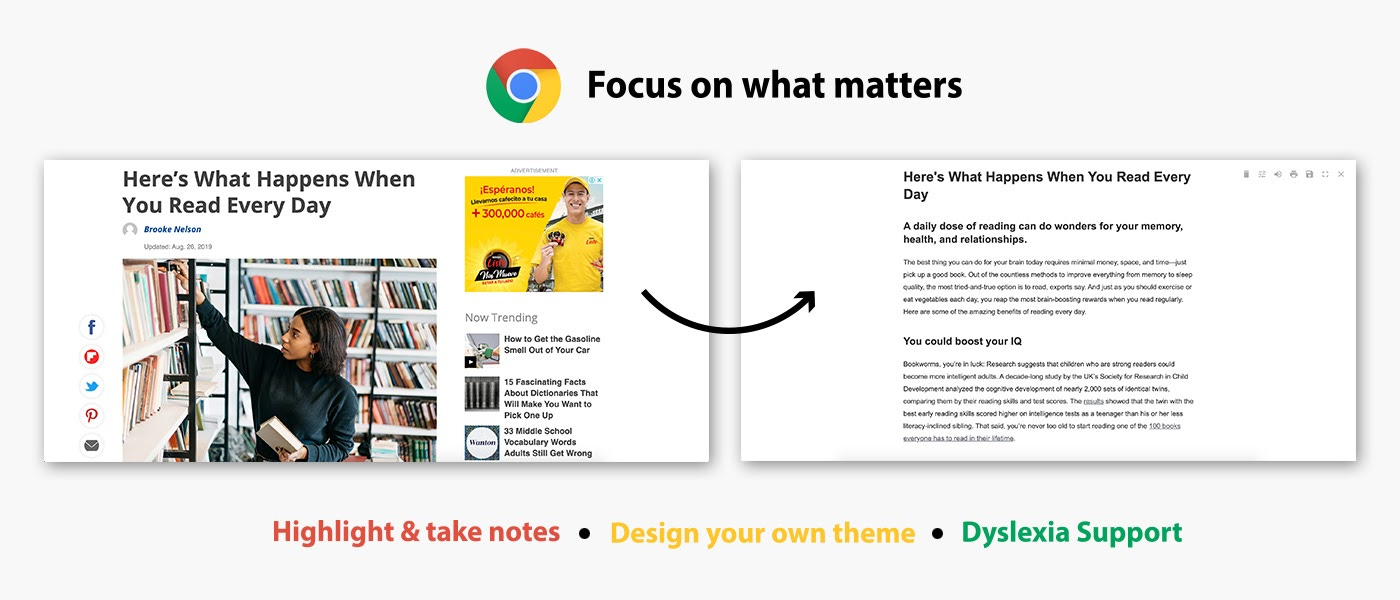What are you reading?
What and how to read your way to the top. Plus, notes on how to take care of your employee's EQ.
Welcome to another edition of ProductiveGrowth 🌱, weekly stories about productivity, leadership, motivation, and anything else that helps us and our teams grow and be more productive. Plus, industry news on the companies, products, and services that allow us to work less and do more.
TL;DR
Reading is a habit encouraged by our surroundings from the moment we’re born. Like it or not, we have to do it for the rest of our lives. For leaders and managers, building a reading habit is a must. Reading regularly has helped me stay up-to-date with the best information in the world, and that ends up getting reflected in my work. But have we actually been taught how to read? Were we ever taught what to read to get us closer to our goals?
In this issue, I want to give you some tools to make your reading more efficient. They’ve worked wonders for me — I’ve made myself a better reader, leader, and person by reading the best books about leadership and taking notes in a meaningful way.
Also, you will find an article on how fostering emotional intelligence, and caring for our employee's mental health can save their lives.
Hope you enjoy it and happy reading!
Steve
Have feedback? Let us know at hello@productivegrowth.com
First time reading? Sign up here.
EDITOR’S PICKS
🤓 Read faster, smarter, and more efficiently in only 5 steps
I’m busy, you’re busy, everyone’s busy. That doesn’t mean we have to eliminate reading from our daily habits or make the experience any less pleasing. Ironically, I’ve been reading about how to read efficiently for years, but not many of the techniques that I read about stuck with me. Not, that is, until I found this piece from MindTools that provides an amazing summary of techniques and tips for reading efficiently by reading intelligently, like controlling your reading environment and identifying key information.
📝 The undefeatable guide for taking book notes in Roam
Taking book notes might be confusing, especially when you try to go back to them and all you see is doodles. Fortunately, we have guys like Nat Eliason telling us all about how he turned note-taking tool Roam into his private digital library with more than 250 books summarized and connected to each other. Read Nat’s step-by-step guide to notetaking to see how you might put his techniques to work in your own library, effectively highlight, and make useful notes.
📚 Thrive your leadership with these 8 books
If a book promises to make you into a leader, it’s lying. However, other people’s journeys have many ways to connect with yours, and there are some amazing books that can bring a lot of value to your process. This Forbes list features some of my favorite authors that I recommend to give you a broad perspective of how to be the best leader you can, including Michael Lewis' inspiring The Fifth Risk.
🧠 The not-so-popular benefits of reading you might want to know about
Beyond the smart and healthy upgrades reading brings to our lives, there’re a whole bunch of other benefits that are not so widely known. This article from Reader’s Digest explains all about the surprising benefits of reading, including one I wasn’t expecting: reading makes you more empathic!
Quote
“In the case of good books, the point is not to see how many of them you can get through, but rather how many can get through to you.” – Mortimer J. Adler
Question
Is there a book that has made you a better leader?
DISCOVER
Reading online has gotten harder over the years. There are ads, videos, and images that take attention away from the text. Amazingly, there is something that can help with that: Reader Mode. A Google Chrome extension that declutters websites and makes it easier for you to read. Some of the benefits: you can design your own theme; highlight & take notes; translate any text to any language; and much more. Read the full review here.
How my boss changed my life by promoting EQ in the workplace
A few years ago, in the middle of a national crisis in Venezuela, I started a job at a small media agency in Caracas. Times were hard. Despite the lack of public transport, I made my way to the office each morning by navigating through crowds of protestors. After that, all I did was look at the computer until my eyes bled and the sun went down. I planned to be the number one employee and to do whatever that took.
Being used to the consuming and competitive world of social media, I often ate lunch at 3 p.m. while frenetically writing at my desk. I was making almost no sense — just trying to rack my brain to find an idea.
That was until one day, a couple of months into this new job, my boss saw me and gave me an order: “You have to stop.”
The next week, she forced me to meditate and do yoga with her. The week after, she came to my desk to tell me she made me an appointment with a therapist. It was 5 p.m., and I’d been sitting in front of my laptop for seven hours straight, ignoring two panic attacks and the conversations around me. I didn’t know it back then, but what she wanted me to do to become the best employee was to be emotionally intelligent. But at that moment, all I could say was “what the f--- are you talking about?”
Breaking it down
Howard Gardner, a renowned psychologist famous for introducing the concept of multiple intelligences to the world, says that Emotional Quotient, or EQ, “is the level of your ability to understand other people, what motivates them and how to work cooperatively with them.”
Coauthor of Emotional Intelligence 2.0 Travis Bradberry assures that 90% of top performers are also high in emotional intelligence, and nearly three-quarters (71%) of hiring managers surveyed by Career Builder in 2011 said they valued an employee’s EQ over their IQ.
These numbers caught my eye because, apart from that valuable and life-changing experience, I’d never been in a workplace where EQ was encouraged, needless to say taught. Even when workplaces have been redefined as learning and growing spaces, leaving behind the days where you only came to do your job, emotional intelligence is not a part of that growth, is just taken for granted.
Seems like, as it works in other aspects of our lives, EQ is always expected to magically show up, without even knowing where it comes from. And, instead of expecting me to totally ignore my panic attacks and stay productive, my boss was expecting me to be mentally healthy in order to be more productive, and she was offering me all of the tools she had.
Why it matters
Everything we do has an emotional component. Whether it is talking to a client, building a new project, or discussing last night’s game with your coworker. Having the proper tools to handle situations, even in your personal life, will be reflected in your work.
A healthy mind is needed in every process we encounter and makes us more productive. We communicate better, ask for help when we need to, handle stressful situations effectively, and save energy for ourselves. Being tired, anxious, depressed, or involved in situations we don’t know how to deal with eventually becomes a bigger problem, affecting our performance, our work relationships, and even our physical health.
I started therapy. I became self-aware and more empathetic. I started managing my anxiety better. I even started eating lunch at noon, at the table, while joking with my boss. Having the proper tools to emotionally deal with the situations that came with my job, I was able to scale into managing positions. But by the time I was there, I realized that if I, as a leader, didn’t encourage and build the emotional skills needed for this or any job with my employees, it could eat them (and me, consequently) alive. I, as my manager before me, had to stretch my hand and do something about it: my team needed to be emotionally intelligent.
Taking it to practice
There are several things that have worked for me, as an employee and as a manager, to develop better emotional skills.
Start with yourself. We can’t encourage skills we don’t have, so developing your own EQ will always be the first step. If you’re in a leadership position, being emotionally intelligent will be not only a resource but a motivation for the rest of your coworkers and employees to follow the same path. Show vulnerability, ask for help, have honest and open conversations, and offer your help when you can. My boss had the tools to help me, and when she gave them to me, I was able to pass them to others.
Create a safe environment. This includes feeling comfortable enough to reach out for help, have constructive conversations, manage emotions, and make up for mistakes. We used to have deep conversations about what was happening in our personal lives and how we, as a company, could improve them so they wouldn’t affect our work.
Make mental health a priority. Encourage people to speak up about their situations, offer specialized help if needed/available and provide any related information that could help them. Also, make taking breaks and resting a part of the job, not a reward. My best ideas came while having lunch with my colleagues and watching Netflix shows together!
Care. Being an emotional person and even developing strong bonds with the people who work with you has been seen as undesirable in workplace culture, but it’s totally the opposite. Honestly caring for your coworkers, employees and yourself, building up a community and being kind to one another can make a huge difference.
Instead of dehumanizing ourselves and those around us, let’s protect and support the most beautiful aspect of working with a group of people: being able to feel, connect and love.
Thanks for reading,
Andrea.
What did you think of this issue?
🙌 Very Interesting - 👏 Interesting - 👌 Meh - 😴 Boring - Other
👋 This is a subscriber’s post! Make sure to participate in the comments, I’d love to 👂hear what you think.
TO CONTRIBUTE
Write a guest post, share your story, or recommend an article: reply to this email or submit here.
Have a piece of news, release, review, job, or event to submit: submit here.
Want to advertise or sponsor a post: inquire here.
Edited by: Lauren Maslen.






